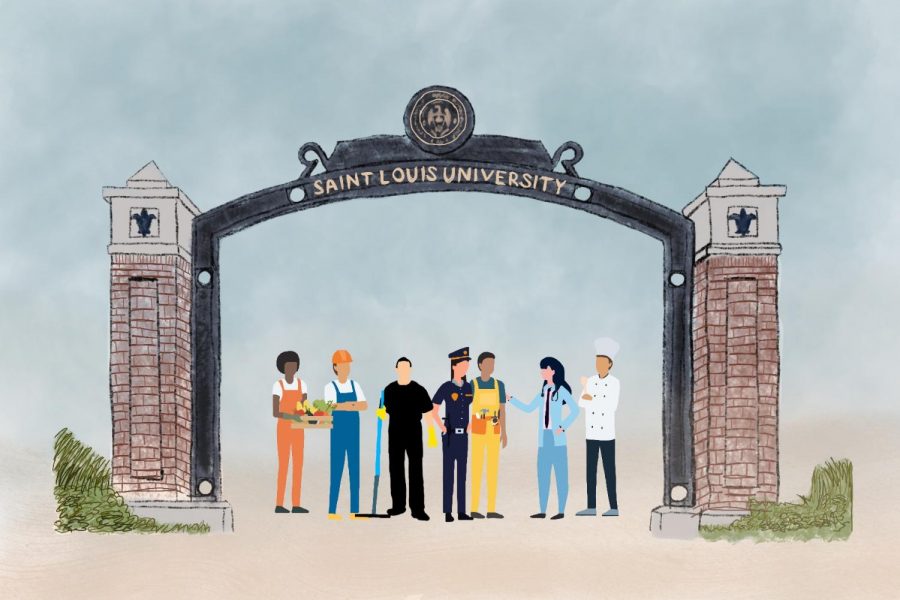Essential Employees Keep SLU Running During COVID-19 Pandemic
Throughout the COVID-19 pandemic, many employees around the country have been afforded the ability to work from home. However, there are some employees whose positions do not allow them the same luxury. These workers are known as “essential employees” and have been on the front lines of the pandemic. There are many essential workers still heading to work every day in the St. Louis area, including at SLU.
According to Vice President of Human Resources Mickey Luna, essential employees are defined as “those who are still required to come into work due to the nature of the services they perform in support of students and patients—and in compliance with state and local stay-at-home orders.”
Luna said the lens through which SLU evaluated whether an employee is essential is whether they must be on campus to deliver the university’s educational and healthcare missions. “These are services that cannot be done remotely,” said Luna. In addition to healthcare workers, some positions deemed essential at SLU include public safety, custodial, maintenance and residential life employees.
There are approximately 450 employees who have been deemed essential by SLU and are still coming into work on a semi-regular basis, according to Luna. For example, some maintenance workers may only be on campus for three days straight. The following week, those same maintenance workers may work only two days on site. “Of course, they are being paid for full-time work,” said Luna. Since many essential employees work on a rotating basis, the actual on-site number each day is much smaller. Luna said healthcare workers were not included in this number because a high percentage of these employees are still required to come in to serve patients.
In terms of workplace safety, Luna said that all essential employees are trained and instructed on how to follow CDC guidelines. “We are closely following all current guidance from the CDC and state and local departments,” said Luna. Social distancing practices have been instituted across employee units, and SLU has also required the use of personal protective equipment (PPE) when appropriate for some roles in compliance with guidance from the Occupational Safety and Health Administration (OSHA). According to Luna, this equipment may mostly include gloves and masks. Additionally, Luna said that all essential employees are required to be screened by Employee Health if they have any symptoms to ensure they receive care or take the necessary steps to isolate themselves if they suspect they have been exposed to or have symptoms of COVID-19. “We have also set aside housing for these individuals if they need to stay on campus to quarantine,” said Luna.
In regard to gradually re-opening the university, Luna said these plans are still underway and have not been finalized. “We currently do not envision everyone returning at once. We expect the return to be more gradual,” said Luna. Luna asserted that guidance from local, state and federal public health officials will ultimately decide how the university proceeds “with the safety of our students, faculty and staff as the guiding principle.”
When asked about if essential employees at SLU will receive hazard pay, Luna said, “No. For the most part, we do not believe employees who are providing essential services are encountering hazards or undue exposure to individuals who have tested positive.” The exception to this would be certain members of SLU’s medical staff, according to Luna.
One of the many essential employees at SLU who have still been going to work is Grounds Supervisor Jim Anthony. Anthony believes SLU Facilities Services, whether it’s grounds, maintenance, custodial or distribution, is essential to SLU’s day-to-day operations. “There are a lot of mechanical issues that need to be addressed, the buildings need to be cleaned and the grass keeps growing,” said Anthony. Work groups in Facilities Services are always operating even if university life is on hold, according to Anthony.
Anthony said the safety measure Facilities Services has taken as they relate to COVID-19 are social distancing (one grounds person per cart), hand washing, wearing a mask when necessary, small work groups and staff working on a modified schedule. In regard to how going to work has felt different since the pandemic, Anthony said the emptiness of campus feels like “summer break on steroids.”
“It’s like a ghost town. However, there are a lot of dedicated people working hard to maintain the campus in anticipation of the students’ return,” said Anthony.
The main idea that Luna wanted to make clear was his and the university’s appreciation for essential SLU employees and all that they’ve done throughout the course of the COVID-19 pandemic.
“First, let me say that we are deeply grateful to employees who are reporting to work each day, performing essential taks to meet SLU’s essential needs. We could not continue to serve our students and patients without them,” said Luna, “They have performed critical work to transform residence halls to safely house doctors, nurses and other caregivers, kept our campus safe and done the necessary work to position the university for when we can all start returning to campus. All members of the university owe them our gratitude and respect.”
Your donation will support the student journalists of Saint Louis University.






Rita Billops • Sep 20, 2020 at 4:19 pm
Although we are essential workers that are required to do our jobs at SLU we are still exposed to one another at work and that is what makes us still at risk as all others. So we do encounter hazard and undue exposures to individuals. So yes we deserve hazard pay.